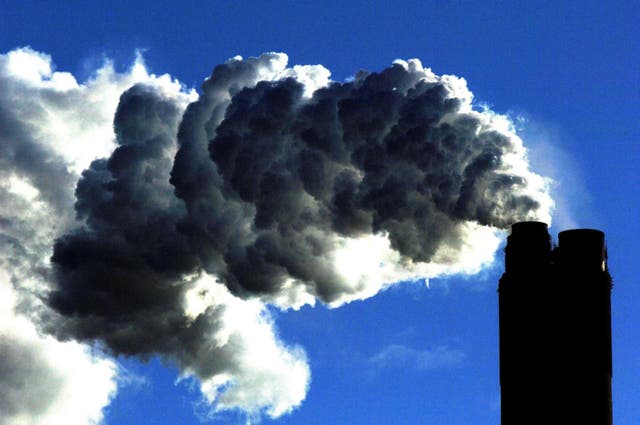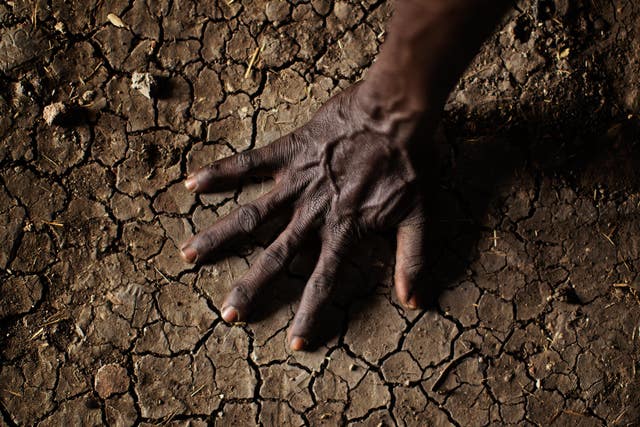
Earth may be decades away from a climatic tipping point that triggers runaway global warming and threatens the future of humanity, scientists have warned.
The threshold will be reached when average global temperatures are only around 2C higher than they were in pre-industrial times, new research suggests. They are already 1C higher, and rising.
Feedback mechanisms acting “like a row of dominoes” will then spin the world into a “Hothouse Earth” state of uncontrollable climate change.
 Limiting greenhouse gas emissions may not be enough on its own to control global warming, the study suggests. (John Giles/PA)
Limiting greenhouse gas emissions may not be enough on its own to control global warming, the study suggests. (John Giles/PA)
Long term, the Hothouse Earth climate will stabilise at a global average of 4C-5C above pre-industrial levels, the study shows.
If that happened, swathes of the planet around the equator will become uninhabitable, with sea levels up to 60 metres (197ft) higher than they are today threatening coastal cities.
A Hothouse Earth would pose “severe risks for health, economies, political stability, and ultimately, the habitability of the planet for humans”, the international scientists wrote in the journal Proceedings of the National Academy of Sciences.
The research highlighted 10 feedback processes that were predicted to kick in at around 2C of global warming.
The “tipping elements” could turn natural carbon storage systems or “sinks” into powerful greenhouse gas emitters.
Professor Johan Rockstrom, a leading member of the team from the University of Stockholm, Sweden, said: “These tipping elements can potentially act like a row of dominoes. Once one is pushed over, it pushes Earth towards another. It may be very difficult or impossible to stop the whole row of dominoes from tumbling over.
“Places on Earth will become uninhabitable if Hothouse Earth becomes the reality.”
The tipping point dangers were identified as thawing permafrost, the release of methane trapped on the ocean floor, weakening land and ocean carbon sinks, increased carbon dioxide production by ocean bacteria, Amazon rainforest die-back, coniferous forest die-back, reduced northern hemisphere snow cover, loss of Arctic summer sea ice, reduced Antarctic sea ice and melting polar ice sheets.
 Scientists have warned of catastrophic climate change (Julien Behal/PA)
Scientists have warned of catastrophic climate change (Julien Behal/PA)
The scientists wrote: “Our analysis suggests that the Earth system may be approaching a planetary threshold that could lock in a continuing rapid pathway toward much hotter conditions – Hothouse Earth. This pathway would be propelled by strong, intrinsic, biogeophysical feedbacks difficult to influence by human actions, a pathway that could not be reversed, steered or substantially slowed.
“Where such a threshold might be is uncertain, but it could be only decades ahead at a temperature rise of (around) 2C above pre-industrial.”
Avoiding a Hothouse Earth would require “deep cuts” in greenhouse gas emissions as well as concerted efforts to remove carbon dioxide from the atmosphere, both by preserving natural carbon sinks and using technology, said the researchers.
Commenting on the findings, climate researcher Dr Phil Williamson, from the University of East Anglia, said: “In the context of the summer of 2018, this is definitely not a case of crying wolf, raising a false alarm. The wolves are now in sight.”
Chris Rapley, Professor of Climate Science at University College London said: “Previous research has shown that an increase in the mean global temperature of 11-12C would make more than half of the land area currently occupied by humans uninhabitable. So, a ‘runaway’ warming to a new and uncontrollable hot state would represent an existential threat to humanity and the majority of existing species.”



Why are you making commenting on The Herald only available to subscribers?
It should have been a safe space for informed debate, somewhere for readers to discuss issues around the biggest stories of the day, but all too often the below the line comments on most websites have become bogged down by off-topic discussions and abuse.
heraldscotland.com is tackling this problem by allowing only subscribers to comment.
We are doing this to improve the experience for our loyal readers and we believe it will reduce the ability of trolls and troublemakers, who occasionally find their way onto our site, to abuse our journalists and readers. We also hope it will help the comments section fulfil its promise as a part of Scotland's conversation with itself.
We are lucky at The Herald. We are read by an informed, educated readership who can add their knowledge and insights to our stories.
That is invaluable.
We are making the subscriber-only change to support our valued readers, who tell us they don't want the site cluttered up with irrelevant comments, untruths and abuse.
In the past, the journalist’s job was to collect and distribute information to the audience. Technology means that readers can shape a discussion. We look forward to hearing from you on heraldscotland.com
Comments & Moderation
Readers’ comments: You are personally liable for the content of any comments you upload to this website, so please act responsibly. We do not pre-moderate or monitor readers’ comments appearing on our websites, but we do post-moderate in response to complaints we receive or otherwise when a potential problem comes to our attention. You can make a complaint by using the ‘report this post’ link . We may then apply our discretion under the user terms to amend or delete comments.
Post moderation is undertaken full-time 9am-6pm on weekdays, and on a part-time basis outwith those hours.
Read the rules hereLast Updated:
Report this comment Cancel